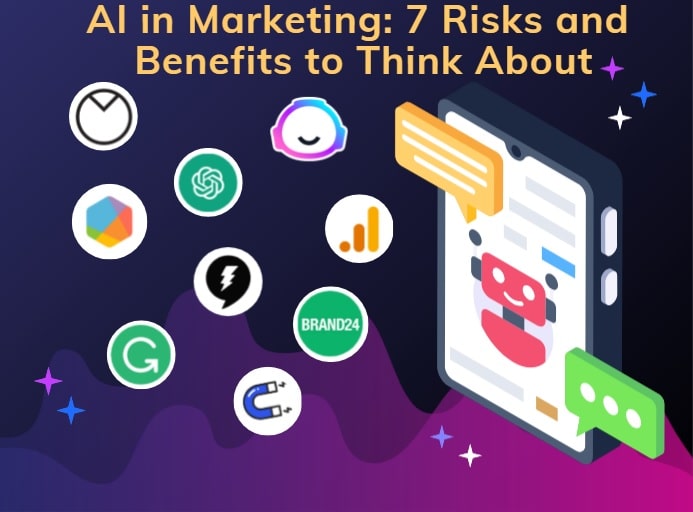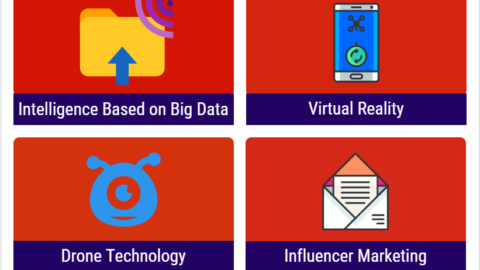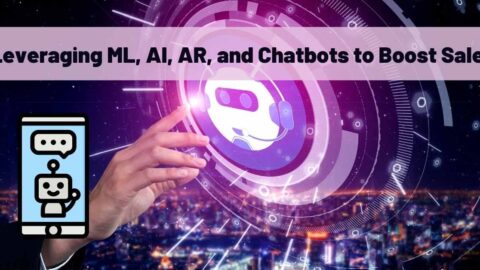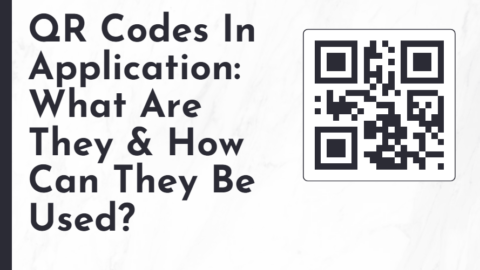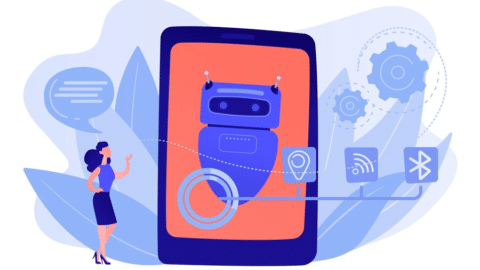AI in Marketing: 7 Risks and Benefits to Think About
AI has become an essential part of our daily lives in the last decade, starting with the introduction of Apple’s Siri and Face ID. But the world was turned upside down in November 2022 with the launch of ChatGPT, a chatbot developed by OpenAI. According to the latest data, ChatGPT has more than 180 million users, and its popularity is still on the rise. New technologies have found their way into digital marketing as automation and data analysis give marketers more freedom. They can now to pursue creative tasks and dedicate their extra time to working on marketing campaigns. Artificial intelligence will expand in the coming years, and experts are predicting a growth rate of 36% by 2030. So, if you are interested in AI marketing, here’s what you need to know:
Table of Contents
AI in marketing: What is it?
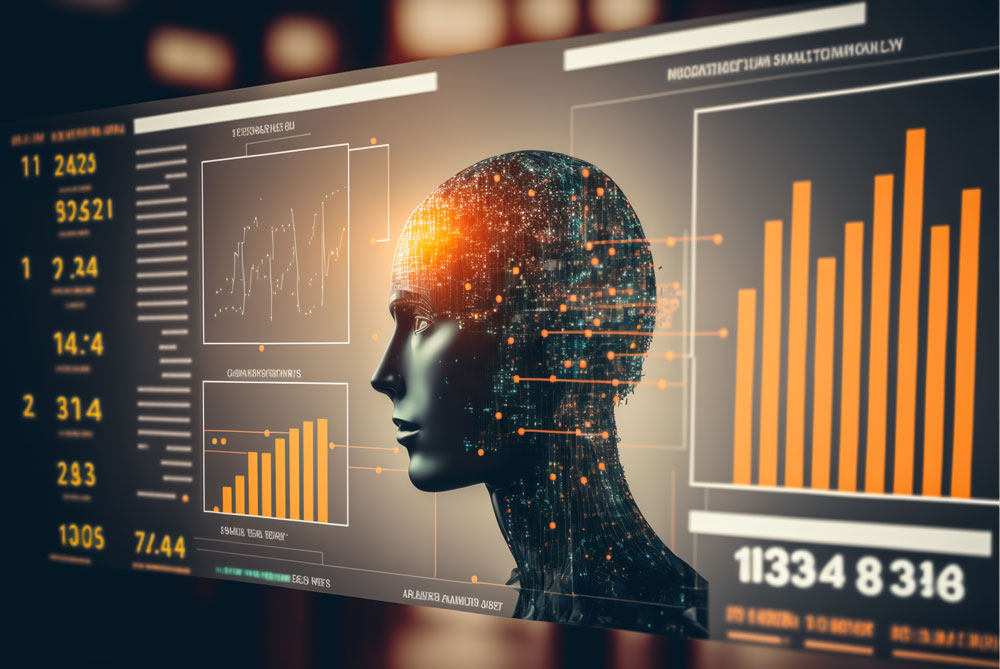
AI marketing includes applying artificial intelligence tools and algorithms for analyzing large quantities of data, automating daily assignments, and researching audience behavior. Additionally, AI helps marketers observe trends that could assist them in future marketing campaigns.
Of course, the growth of AI also includes new cyber threats since hackers are learning how to exploit machine learning for various malware types. Remember to prioritize your online safety regardless of the line of work you are in. Protect your data from AI-powered malware types using VPN and antivirus software, especially while on ChatGPT and similar websites.
Some tasks require efficiency, and that is where AI truly shines. It enables fast communication with customers and allows marketers to focus on other responsibilities. As AI continues to develop, it will have an even larger role in marketing. Now is the right time to implement the new technology.
How is AI used in marketing?
AI is used in marketing to enhance customer experience, optimize campaigns, and generate insights. It can help marketers understand customer behavior, preferences, and needs, and deliver personalized and relevant messages across channels. AI can also automate and streamline marketing tasks, such as content creation, email marketing, social media management, and web design. AI can also analyze large amounts of data and provide actionable recommendations for improving marketing performance and ROI.
Risks and benefits of AI in marketing
Now that we have covered what AI is and how to use it in marketing, let’s take a closer look at all the risks and benefits that come with it:
1. Benefit: Increased productivity

One of the perks of using AI for marketing is making repetitive daily tasks a thing of the past. Content creation and data analysis can be passed on to AI, allowing marketers to work on other assignments that require creativity and teamwork. With these time-consuming tasks out of the way, marketers can let their imaginations shine and create new and exciting things in the future.
2. Risk: Completely relying on chatbots
Chatbots can be useful for particular issues, but they can’t replace an actual person trying to solve a problem or answer questions. Conversations with chatbots are not very versatile, and users might get frustrated along the way. While AI has come a long way, it seems like chatbots need more development, which will probably come sooner than we think.
3. Benefit: High levels of personalization via AI in Marketing
Personalized recommendations and content are some of the best parts of targeted marketing. For instance, AI can make product suggestions by looking at a customer’s recent purchases or even browsing history. Marketers can choose the right ads to target individual users, which improves the chances of conversions.
Furthermore, email personalization has shown excellent results when it comes to email marketing. These tools go through the mailing list and provide unique subject lines, paragraphs, and more. AI can completely revamp the email content and even learn when to send an email to ensure that the target audience sees it.
4. Risk: Ignoring the human side of marketing
Compassion and emotions are traits that AI may lack. This can be seen in personalized messages and emails. AI will include someone’s name, but chances are your customers will notice that the content of a message is not written by a real person. Therefore, AI-generated newsletters could sound slightly cold and generic without human input. If you rely entirely on AI to create these messages, you might miss the opportunity to share your originality.
5. Benefit: Excellent data analysis
What makes AI algorithms valuable to marketers is their ability to analyze a lot of data and provide essential information that can be used for future decisions. The perfect example of this is AI’s capability to create customer groups by looking into someone’s online behavior and personal preferences. Moreover, AI may collect data across websites and add that knowledge to an existing customer profile.
6. Risk: Delivering wrong information due to AI in Marketing
Machine learning is as good as the data used for the training. Therefore, AI technology is not always entirely accurate and might deliver incomplete insights. Even ChatGPT’s knowledge stops in 2021 at the moment. Those who utilize ChatGPT should prioritize online safety and enable VPN. Otherwise, you might encounter various malware types. One of these malware types is AI-driven malware, which uses AI to evolve and spread. They are very hard to detect and delete from the system.
7. Benefit: Creating better campaigns
AI can focus on precise aspects of customer data and combine it with information about their behavior to come up with the most effective marketing campaigns. Targeting the audience at the right time is extremely important for the success of a campaign, and AI’s data analysis delivers the results. You will know when and where to place an ad to interest your audience in products or services. Not to forget that AI can provide instructions on how to divide a campaign budget.
How artificial intelligence will change the future of marketing?
Artificial intelligence (AI) is transforming the field of marketing in various ways. AI can help marketers analyze data, optimize campaigns, personalize content, generate leads, and improve customer experience. AI can also enable new forms of creativity, such as generating slogans, logos, images, and videos. And AI will change the future of marketing by making it more efficient, effective, and engaging.

Ananya Prisha is an enterprise level Agile coach working out of Hyderabad (India) and also founder of High Level PM Consultancy. Her goal has been to keep on learning and at the same time give back to the community that has given her so much.

